
Hot air Mk2
Jon Ison - 11/3/08 at 05:30 PM
Following on from Hot air been playing this afternoon.
Got to make a lid for it and tidy up a lot but open to advice on this......aim is to put an exit wound in bonnet rather than nosecone......
Looks ok to now ?
Good idea still ?
Bad idea ?
Comments advice, always willing to listen.
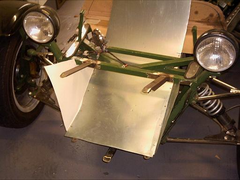

Rescued attachment hotair1.JPG
Jon Ison - 11/3/08 at 05:30 PM
with rad stuck infront..........
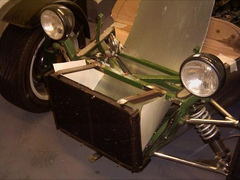

Rescued attachment hotair2.JPG
chris_harris_ - 11/3/08 at 05:35 PM
I think it looks like a great idea, have often thought about doing this, and may still do as a winter mod. Once its on the road that is. How where
you planning to make it all fit snuggly without any air escaping into the engine bay, and will the engine bay itself still get a good air circulation?
Jon Ison - 11/3/08 at 05:39 PM
It wont be the tightest fit/joints with some leaks, is that a problem ?
Plenty of air will be dragged in I guess from underneath plus with the nose cone on some air will go down the side and over radiator into engine
bay.
A cold air feed to the four air gobbling intakes is planned to.
Mr Whippy - 11/3/08 at 05:39 PM
in summer your engine bay might get very hot (from the exhaust), I'd put some mesh grills in the hood
Jon Ison - 11/3/08 at 05:43 PM
quote:
Originally posted by Mr Whippy
in summer your engine bay might get very hot (from the exhaust), I'd put some mesh grills in the hood
My thoughts to, I had planned if it works to make a new bonnet with louvers in it, I can chop an exit wound into this bonnet as its already slightly
damaged and a new one is planned, if it all fails then new bonnet on and back to as you where.
Should I be exiting in the bonnet or nose cone though ? I plumped for bonnet to keep the angle less.
chris_harris_ - 11/3/08 at 05:45 PM
Having a few gaps isn't i suppose going to give too many issues, i do however have concerns about the engine bay temp, looking at the previus
thread there was a mention of +50c when stationary, now that would worry me. Have also been considering the side vents option as has been discussed
recently, even a 10mm gap 30 cm long both sides just at the front of the scuttle could give quite a bit of air movement.
Another option would be a small fan behind the duct, in the bay, but that is all space dependent.
Just my own thoughts really.
nitram38 - 11/3/08 at 05:47 PM
If you have got that much space, why not fit a bigger radiator at an angle, still within a duct as you have done?
For your engine, rather than grills or louvres, fit a few NACA ducts in the bodywork. They will produce more airflow.
[Edited on 11/3/2008 by nitram38]
Jon Ison - 11/3/08 at 05:53 PM
quote:
Originally posted by nitram38
If you have got that much space, why not fit a bigger radiator at an angle, still within a duct as you have done?
For your engine, rather than grills or louvres, fit a few NACA ducts in the bodywork. They will produce more airflow.
[Edited on 11/3/2008 by nitram38]
NACA ducts ?
The whole point of what I'm up to is to keep engine bay temps down, am I going the wrong route ?
indykid - 11/3/08 at 06:08 PM
you want naca ducts to get air into the engine bay rearward of the duct.
if you just cut a hole, air won't naturally be drawn in, but with a NACA, the pressure differential it creates from its shape makes air flow into
it.
if you could, i'd bring the duct up in front of the green tube rather than so tight behind it. it'll create all sorts of turbulence
otherwise.
tom
Puk - 11/3/08 at 06:36 PM
Hi Jon,
I've been considering a ducted rad for my design (lot of considering going on over here in Denmark and precious little else to be honest). Here
is my take for what its worth. Ducting a rad gives less drag for the same heat transfer. So if the heat transfer goes up with ducting, there will be
less heat to be lost from direct from the engine to the air flowing through the engine bay.
The original Lotus 11 has a tiny inlet for its radiator ducts (designed by Frank Costin) not sure if he needed allot of air flowing through the engine
bay as well. But doubt that Costin would have rested until he'd made the ducting work! Formula Fords use ducted rads and fairly enclosed engine
bays. So it can be done.
Race Car Vehicle Dynamics give a useful empirical result "For small pressure drop [radiators] inlet duct area larger than 80% of radiator area
produces no additional airflow." For high pressure drop rads that drops to 67%. It goes onto proscribe an exit area of 1.2 times the rad size.
Obviously there is a bit more than that to it - I'll scan you the pages it you like.
The physics is that the air comes through duct opening and is passed into an expanding duct, which slows it down which benefits heat transfer. After
the rad the duct needs to continue to expand to allow the now hot air to expand and accelerate to match the airflowing past the car.
If after completing the ducting the engine temp is too high, then you can go about adding louvers and grills etc. I think thats called hedging your
bets 
Cheers,
James
nitram38 - 11/3/08 at 06:38 PM
Go here for explanation and a ferrari with them in the bonnet and side wings 
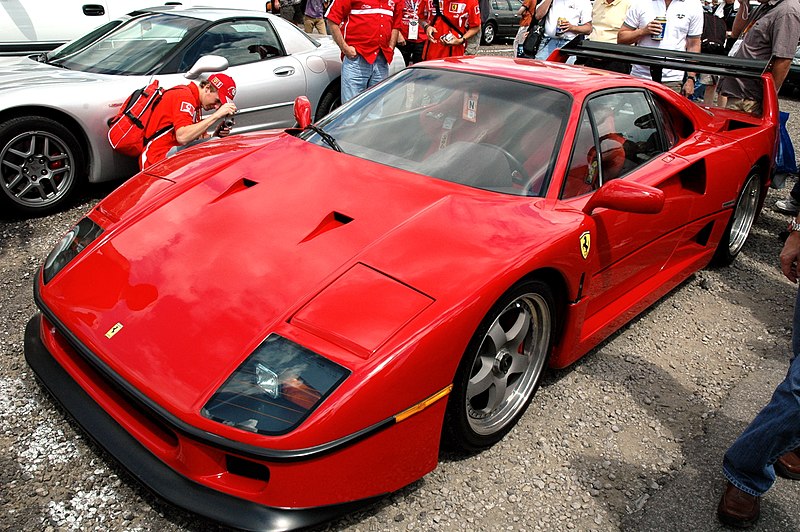
I am using one each side of the MotaLeira to provide some sort of "ram air" for my R1 airbox.
[Edited on 11/3/2008 by nitram38]
[Edited on 11/3/2008 by nitram38]
Jon Ison - 11/3/08 at 07:30 PM
mmm, starting to get a bit confused now (not to difficult)
Am I barking up the wrong tree and should I abandon the idea, the reason I'm doing it is i thought to stop the engine getting soaked in hot air
from the radiator, I don't have a cooling problem with things as they are, just trying/fiddling with things.........
Puk - 11/3/08 at 07:51 PM
If you don't have cooling problem then the upside of this is less drag. Not sure if you'll detect that though...
If you're pushing the hot air out through a duct then it won't be flowing around the engine bay - got to be good.
The risk that you identified was that less air flow in the engine bay may cause over heating. I don't think that would be the case though because
the radiator will be working more efficiently allowing more heat to be pulled out of the engine through the water system.
That can't be guaranteed though - and if you do get overheating you can cut some holes into the engine cover.
So my vote would be to stick with it - you haven't got anything to loose and you could gain some top end.
Cheers,
James
Jon Ison - 11/3/08 at 08:29 PM
I've talked myself into carrying on now, i didnt have any engine bay heat problems with the GT1 and that was totally enclose with a flat floor
and and rear bulkhead directly in front of it........
indykid - 12/3/08 at 03:03 PM
quote:
Originally posted by Puk
The physics is that the air comes through duct opening and is passed into an expanding duct, which slows it down which benefits heat transfer. After
the rad the duct needs to continue to expand to allow the now hot air to expand and accelerate to match the airflowing past the car.
the first bit is correct, but after the rad, the duct needs to contract again to make the air accelerate.
think of it like putting your finger over the end of a hosepipe. to maintain the volumetric flow. the gas speed needs to increase to get the same air
through less space.
that's what milliken and milliken and competition car aerodynamics led me to believe anyway.
tom
Jon Ison - 12/3/08 at 05:01 PM
That's ok then cos it does contract, here's a pic of the exit wound, as you can see the bonnet's naf anyway so didn't mind trying
it, a tidy up, some edging on and give it a whirl........
Should I cover the exit wound with mesh ? I have some.
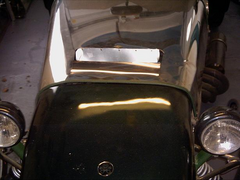

Rescued attachment air1.JPG
vinnievector - 14/3/08 at 08:02 AM
Hi ,thought Venturi ducting would work for this . inlet tapering before rad this will compress the air ,then taper back out set the rad into the
expanding air flow which is cooler from the expansion this is how heat exchangers work on aircraft albeit at a higher pressure .
So to sum up and get the best cooling duct compress first then expand
[Edited on 14/3/08 by vinnievector]
MikeRJ - 14/3/08 at 12:08 PM
quote:
Originally posted by vinnievector
So to sum up and get the best cooling duct compress first then expand
But compressing the air (if you could actually do it to any significant degree) would heat the air first, so surely you wouldn't gain anything?
Puk - 15/3/08 at 07:53 AM
Hi Jon - that exit wound looks neat, just spotted this image of the set up on a Donkavoot:

I'm really keen to hear how your set up works out once the weather warms up. Which going by present climate could be any day now!
Hi Indykid, Vinnie, Mike - contracting the duct before the rad can cause back pressure in the duct, when what is really required at car speeds is
deceleration of the air flow to aid heat transfer (I'm paraphrasing from Milliken). Contracting after the after rad would probably cause one or
all of pressure up, velocity up or temperature up (the elements of Bernouli's equation). The radiator will have passed heat to the flow stream so
there is more energy in the air stream. I must admit when I wrote the origonal post I thought that contraction would be in order but if you take a
look at Figure 15.63 in Milliken they show an expanding duct. So without doing the sums I took the view that one of two things was happening:
The energy imparted to the duct by the rad was necessitating the expanding duct
OR
That a contracting duct at these relatively low velocities would cause back pressure.
Have you had a look at the set up on a Lotus 11? Tiny inlet port duct to the rad but then air allowed to flow into the engine bay and wheel
arches.
Cheers,
Puk
[Edited on 15/3/08 by Puk]
Jon Ison - 15/3/08 at 08:49 AM
Well I'm a bit further on, 1/2 way through tidying up the exit wound, I'm afraid its always going to look like a DIY job but that's the
locost ethos anyway.
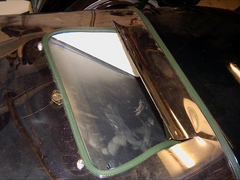

Rescued attachment duct1.JPG
chriscook - 15/3/08 at 08:55 AM
Jon,
Have a look for previous posts by Rob Palin on these matters - he knows what he is talking about.
Chris




